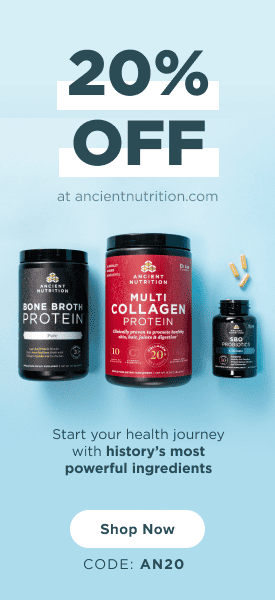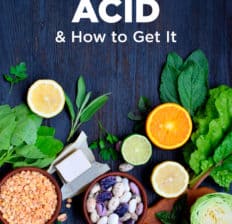This Dr. Axe content is medically reviewed or fact checked to ensure factually accurate information.
With strict editorial sourcing guidelines, we only link to academic research institutions, reputable media sites and, when research is available, medically peer-reviewed studies. Note that the numbers in parentheses (1, 2, etc.) are clickable links to these studies.
The information in our articles is NOT intended to replace a one-on-one relationship with a qualified health care professional and is not intended as medical advice.
This article is based on scientific evidence, written by experts and fact checked by our trained editorial staff. Note that the numbers in parentheses (1, 2, etc.) are clickable links to medically peer-reviewed studies.
Our team includes licensed nutritionists and dietitians, certified health education specialists, as well as certified strength and conditioning specialists, personal trainers and corrective exercise specialists. Our team aims to be not only thorough with its research, but also objective and unbiased.
The information in our articles is NOT intended to replace a one-on-one relationship with a qualified health care professional and is not intended as medical advice.
Folic Acid Benefits: Does Your Diet Provide Enough?
January 10, 2024

There’s no doubt that folic acid is incredibly important. Although perhaps most well-known for its impact on prenatal health and neural tube development, this essential B vitamin is involved in so much more.
From supporting heart health to enhancing brain function, folic acid is a water-soluble nutrient that you definitely want to be sure you get enough of.
What is folic acid good for? What does folic acid do in the body? Why would you take folic acid? Let’s dig in to these questions one at a time and explore how this key vitamin can impact health.
What Is Folic Acid?
Folate, also known as vitamin B9, is an important water-soluble vitamin that plays a role in many aspects of health. It aids in cell division and helps make new blood cells by copying and creating DNA.
It also helps the body use vitamin B12 as well as certain amino acids.
Is folate the same as folic acid? If not, what’s the difference between folate vs. folic acid? Although the terms are often used interchangeably, there are several differences between the two.
Folate is naturally found in food sources like fruits, vegetables and legumes. Folic acid, on the other hand, is the synthetic form of folate and can be taken in supplement form or found in fortified items like enriched flour, pasta, cereal, bread and rice.
Interestingly enough, some studies have found that folic acid is actually more well-absorbed than folate from food sources. A study published in the American Journal of Clinical Nutrition found that the folate in food is about 78 percent as bioavailable as folic acid.
If you eat many folic acid foods, there’s no reason to supplement with 100 percent or more of your daily folic acid requirement as provided by the U.S. Food and Drug Administration. For multivitamins and other supplements containing folic acid, around 15 percent to 20 percent of the daily recommended amount of folic acid is plenty.
Fermented folic acid is also preferable. Fermentation is a process of pre-digestion that may be able to prevent unmetabolized folic acid buildup.
Filling your plate with folate sources is the best option to meet your daily needs because these foods are also high in other essential nutrients that are important to health. While folic acid supplementation may be a useful tool for preventing deficiency in some, incorporating plenty of nutrient-dense folate and folic acid foods can help most people meet their daily folate requirements while also supplying an array of other crucial vitamins and minerals.
Why You Need It
Research indicates that a folate deficiency can have serious consequences, including fatigue, painful mouth sores and even an increased risk of birth defects — like heart problems, neural tube defects, spina bifida and anencephaly.
Folic acid is the synthetic form of folate that is found in most prenatal vitamins, supplements and fortified products. Folic acid for pregnancy is often recommended by many doctors to help ensure that folate needs are met and to protect against pregnancy-related complications.
In fact, in 1991, the Centers for Disease Control and Prevention recommended that women with a history of pregnancies affected by neural tube defects should begin taking 4,000 micrograms of folic acid daily from the time they begin planning a pregnancy. A year later in 1992, the U.S. Public Health Service advised that women of childbearing age should start getting at least 400 micrograms of folic acid or folate daily through diet, supplementation or fortified folic acid foods.
In an effort to prevent dangerous birth defects caused by folate deficiency, many countries around the world have strict regulations in place requiring food manufacturers to fortify certain products with folic acid. In the U.S., for example, fortification of enriched cereal grains with folic acid was fully authorized in 1996 and fully implemented just two years later, in 1998.
Today, 53 countries around the globe have regulations in place for mandatory fortification of wheat flour in an effort to reduce the risk of birth defects.
Studies also suggest that folate is associated with improved cognitive function and protection against depression and Alzheimer’s disease. It may also help support strong bones, decrease symptoms of restless legs syndrome and promote the health of the nervous system.
Benefits
1. Promotes a Healthy Pregnancy
Because of its involvement in DNA synthesis and important enzymatic reactions, folate is a critical component of a pregnancy diet.
During pregnancy, your folate requirements even increase to help support fetal growth and development. In fact, many health care professionals even recommend starting supplementation or eating more folic acid foods before pregnancy to prevent birth defects.
One of the most well-known benefits of folate is its ability to reduce the risk of neural tube defects that can affect the brain, spine or spinal cord. However, research suggests that meeting your folate needs can also decrease the risk of anemia, preterm birth and pregnancy complications.
Research also suggests that taking dietary supplements with folate and iron may prevent low hemoglobin or anaemia at delivery.
2. May Decrease Cancer Risk
Emerging research shows that folate could aid in the prevention of certain types of cancer. A review published by the Department of Medicine at St. Michael’s Hospital in Toronto indicates that maintaining adequate folate levels or increasing folate intake from dietary sources and supplementation could reduce the risk of pancreatic cancer and breast cancer for certain populations.
Other studies have found that folate intake could be associated with a lower risk of colorectal, esophageal and ovarian cancers, too.
Keep in mind, however, that other studies have shown that excess folic acid intake from supplementation and fortified foods may actually be associated with an increased risk of certain kinds of cancer. More research is needed to fully understand the role that folic acid and folate may play in cancer prevention and development.
3. Supports Heart Health
Studies show that folic acid supports heart health and could help reduce the risk of heart disease. Higher levels of folate are linked to lower levels of homocysteine, a type of amino acid that can contribute to the formation of blood clots and cause arteries to narrow and harden.
Increasing your intake of folate may help decrease homocysteine levels to prevent heart disease. In fact, a 2012 analysis out of China found that each 200-microgram increase in folate intake was associated with a 12 percent drop in the risk of developing coronary heart disease.
4. Builds Strong Bones
In addition to being associated with a greater risk of heart disease, elevated homocysteine levels may also impact bone health. Studies show that folic acid can decrease homocysteine levels and impact the rate of bone metabolism to promote better bone health.
One 2014 study suggests that increased plasma homocysteine is associated with decreased levels of folate as well as reduced bone mineral density. Plus, another study published in the New England Journal of Medicine showed that higher levels of homocysteine were a risk factor for osteoporotic fractures in older adults.
5. Improves Cognitive Function
Low levels of folate, along with other B vitamins like vitamin B12, have been associated with cognitive decline and dementia. A study published in the American Journal of Clinical Nutrition found that low folate status was associated with impaired cognitive function in the elderly.
One 2016 study concluded that folic acid supplementation was able to effectively improve cognitive function in older adults with mild cognitive impairment.
Another study published in 2005 also found that a higher intake of folate was linked to a reduced risk of developing Alzheimer’s disease.
6. Reduces Symptoms of Restless Legs Syndrome
Restless legs syndrome is a condition characterized by the urge to move the legs, especially at night. While anyone can be affected by restless legs syndrome, pregnant women are more prone to developing the condition.
Studies show that low levels of folate may be associated with the development of restless legs syndrome, especially during pregnancy. Interestingly, according to a paper in Alternative Medicine Review, folic acid administration may help reduce the symptoms of restless legs syndrome.
Recommended Intake
Most adults need about 400 micrograms of folate, but the daily requirements increase for women who are pregnant or breastfeeding to 600 micrograms and 500 micrograms, respectively.
Folic acid dosage can range anywhere from 100–800 micrograms, and most prenatal vitamins generally include between 600–800 micrograms of folic acid per serving.
How much folic acid is too much? If you get your folate from healthy, whole-food sources like fruits and vegetables, the risk of folic acid overdose is minimal. In some cases, supplements may be necessary, especially if you have increased needs or any issues with nutrient absorption.
However, taking high amounts of supplemental folic acid or eating lots of foods rich in folic acid can increase the risk of adverse side effects like cramps, diarrhea, confusion, difficulty sleeping and mood changes. Therefore, it’s best to stick to less than 1,000 milligrams per day from fortified foods and/or supplements.
If you do decide to use a supplement, opt for L-methylfolate instead of folic acid tablets. This is the biologically active form of folate, and some research suggests that it may mitigate some of the risks associated with high folic acid intake.
Food Sources
Ideally, you should get the majority of your folate from natural, whole-food sources like fruits, vegetables and legumes. Not only can these nutrient-dense foods provide folate, but they are also rich in other vitamins and minerals that your body needs.
However, if you’re unable to meet your folate needs through foods or have a condition that impairs absorption, your doctor may recommend taking folic acid dietary supplements or eating more fortified products high in folic acid to help meet your needs. These may include healthy cereals, whole grain products, enriched breads, pastas and rice.
What foods have folic acid? Which contain natural folate instead?
Folate can typically be found in fruits, veggies and legumes, including foods like spinach, asparagus, avocados and beans. It’s also found naturally in beef liver, a nutrient-dense ingredient that can supply up to 54 percent of your daily folate requirement.
Folic acid, on the other hand, is present in enriched products, meaning it has been added into the final product to boost its nutrient content. Some of the top folic acid sources include rice, bread, pasta and cereal. Although the exact amounts can vary quite a bit, most contain between 25 percent to 50 percent of the daily recommended value.
Deficiency
Getting too little or too much folic acid can be detrimental to health. A deficiency can cause symptoms like folic acid anemia, weakness, headaches and fatigue. Conversely, loading up on folic acid can also be harmful and may cause symptoms like cramps, diarrhea and confusion.
Folate deficiency on its own is uncommon. Since it typically stems from causes like a poor diet, alcoholism or issues with nutrient absorption, folate deficiency is often found coupled with other nutrient deficiencies.
Folic acid deficiency anemia, known as “megaloblastic anemia,” is the main clinical sign of low folic acid and B12. Megaloblastic anemia results in the production of red blood cells that are abnormal and large, causing symptoms like weakness, fatigue, pale skin, headaches, shortness of breath, heart palpitations, weight loss and nausea.
Women who are pregnant or of childbearing age, people with an alcohol dependence, and those with malabsorptive disorders are at the greatest risk for folate deficiency. Folic acid deficiency in the elderly is also a problem, especially in those with a poor diet or decreased appetite.
Risks and Side Effects
Folate is incredibly important to nearly every aspect of health, including the production of red blood cells and supporting development in early pregnancy, so if you suspect that you may have a deficiency, it’s important to talk to your doctor and get your blood levels tested.
Ideally, you should aim to get the majority of your folate through natural food sources, including fruits, vegetables or legumes. However, in some cases, supplemental folic acid for men and women is necessary, either due to issues with absorption or increased nutrient needs.
If you do decide to use a supplement or consume fortified foods to help meet your needs, be sure to avoid going overboard to avoid potential side effects of folic acid. Consuming high amounts can cause symptoms like cramps, epilepsy, mood changes and difficulty sleeping. It may also mask vitamin B12 deficiency, leading to even more health issues if left untreated long term.
Conclusion
- Folic acid is a vitamin of the B complex found especially in leafy green vegetables, liver and kidney. To be more specific, folate is the form that is found naturally in most food sources, while folic acid is available in fortified foods and supplements.
- What is folic acid used for? Within the body, folic acid uses include aiding in cell division, replicating and synthesizing DNA and promoting fetal growth and development. It’s especially needed during early pregnancy.
- Potential benefits of folic acid include a reduced risk of cancer, improved cognitive function, stronger bones, enhanced heart health, better pregnancy outcomes and reduced symptoms of restless legs syndrome.
- A deficiency can cause issues like anemia, stunted growth, heart problems and neural tube defects. Conversely, consuming too much folic acid from fortified foods or supplements can lead to other adverse effects on health as well.
- Therefore, you should get most of your folate through whole-food sources, such as fruits, vegetables and legumes, to help meet your daily needs and reduce the risk of side effects.













